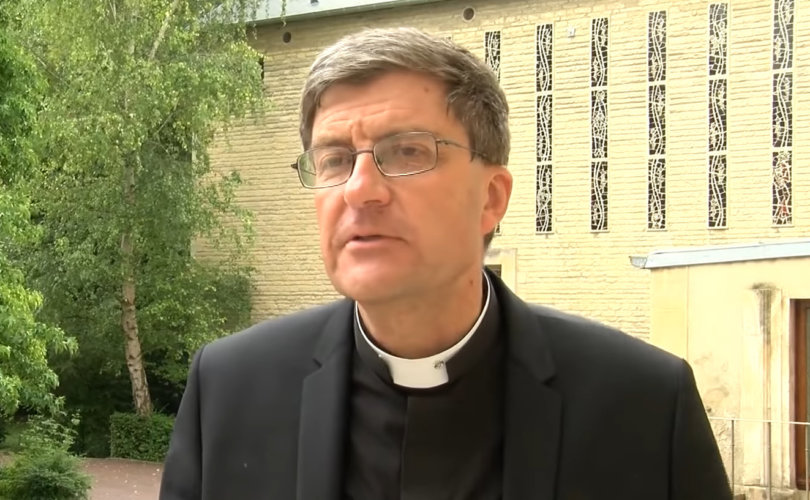(LifeSiteNews) — Eric de Moulins-Beaufort, Archbishop of Reims and president of the French Bishops Conference, published a groveling communiqué after his meeting with home affairs minister Gérald Darmanin, who had summoned the prelate to a meeting following his statement saying that “the seal of confession is binding” for Catholic priests, “and as such, it is stronger than the laws of the Republic.”
Moulins-Beaufort pronounced these words in an interview following the publication of a damning report on clerical sex abuse of minors and vulnerable people last week, in which an “Independent Commission on Sexual Abuse in the Church” (CIASE) concluded that some 216,000 people had undergone such crimes at the hands of priests and religious between 1950 and 2020, not counting about 100,000 more who had suffered sexual abuse on the part of lay collaborators of the Church.
One of the CIASE’s most spectacular recommendations was for the Church to remove the seal of confession in case of sexual abuse of minors, obliging priests who heard of such crimes from penitents to report details to the civil authorities.
This recommendation was in fact made public during the official handing-over of the report in the conference hall of the French Bishops Conference on October 5. In his short acceptance speech, de Moulins-Beaufort did not address the issue at all. It was only next day, answering questions during a radio interview with FranceInfo, that he made his explanatory remarks. These immediately triggered a summons from minister Darmanin and indignant reactions from government spokesman Gabriel Attal, who revealed that president Emmanuel Macron himself had asked the bishop to be summoned and added: “The reaction to these remarks is very clear: there is nothing stronger than the laws of the Republic in our country.”
The meeting took place on Tuesday afternoon at the Ministry of the Interior in Paris. Eric de Moulins-Beaufort published the following communiqué soon afterwards:
I ask forgiveness of the victims and all those who may have been pained or shocked by the fact that the debate sparked by my remarks, on FranceInfo, on the subject of confession, took precedence over the acceptance of the content of the CIASE report and over concern for the victims.
+ Éric de Moulins-Beaufort
Of course, the bishop had no responsibility in the fact that the debate should have taken place at all, since — surprisingly, for the Catholic faithful — he did not immediately underscore the absolute character of the seal of confession when the “Independent Commission” mandated by the Church in France made public its suggestion.
Instead, he waited for a journalist to question him regarding the CIASE’s recommendation, and then gave his answer, which is a mere reiteration of what the Catholic Church believes and teaches, without even touching upon the nature of the sacrament of Penance that makes the confessor the recipient of the confession of sins acknowledged before God.
The “debate” that followed was due to the secularist reaction of the French executive.
The archbishop’s apology was followed by a press statement by the French Bishops Conference that gave further information:
Mgr. Éric de Moulins-Beaufort, President of the French Bishops’ Conference, met with Gérald Darmanin, minister of the Interior in charge of religious affairs, on Tuesday, October 12, at the latter’s invitation. They were able to discuss the quest for truth by the Catholic Church in France regarding the sexual violence and assaults committed within this institution since 1950. The publication of the report of the CIASE (Independent Commission on Sexual Abuse in the Church) is an essential step in this quest for truth, and the work done by Mr. Jean-Marc Sauvé and his team has been acknowledged to be remarkable. The French Bishops Conference (CEF) and the Conference of Religious in France (CORREF) have asked the Pope to grant an audience to Mr. Jean-Marc Sauvé and the members of the CIASE.
Regarding the “remarkable” work of the Commission, it is necessary to set some records straight. Its report speaks of a total of “2,900 to 3,200” “predators,” and of “at least” 10,000 victims, of whom a fraction actually spoke to the CIASE, either in direct conversations (243) or in writing (2,819).
To reach the number of 216,000 quoted above, investigations were not so meticulous. The Commission asked IFOP, a mainstream polling institute, to survey a representative sample of the French public, including 28,010 individuals who answered an anonymous online questionnaire, and extrapolated from there. No mention is made in the report of guidelines to verify the veracity of these responses.
Besides, the handling of the survey results was done by Nathalie Bajos, a member of the CIASE who is a researcher by profession at INSERM (National Institute for Health and Medical Research), where she directs the “Gender Team.” She has previously conducted research on contraception as a tool for “masculine domination,” access to contraception in France, “contemporary issues regarding the legalization of abortion,” and the like. Bajos often expresses herself in feminist and mainstream media and can be perceived as a “left-wing feminist.”
In a conference given by Bajos at the Don Bosco Lycée (high school) in Nice, on the southern coast of France in 2001, she made clear that she favors “sexual autonomy” for minors and that the fact that children watch porn should not “alarm” their parents because it is just one element of their sexual development. The video of that conference was unearthed by FL24.
The CIASE report revealed that over 50 percent of clerical predators admitted to having had illicit sexual relations before entering the priesthood, or to having had a problem with pornography.
Such information sheds a new light on the CIASE report: In reporting truly horrible crimes it did not insist upon the shattering of children’s innocence but on the fact that they were submitted to sexual acts to which they could not give their free consent because of the authority their aggressors had over them.
The French Bishops Conference’s press statement went on to say:
Mgr. Éric de Moulins-Beaufort was able to discuss with Mr. Gérald Darmanin the awkward wording of his answer on France Info last Wednesday morning. The State has the task of organizing social life and regulating public order. For us Christians, faith appeals to the conscience of each person, it calls to seek the good without respite, which cannot be done without respecting the laws of one’s country.
While it is true that “[t]he State has the task of organizing social life and regulating public order,” according to the distinction that should be made between the temporal and the spiritual, all state laws are not respectable, either because they encroach upon the realm of the spiritual, or because they contradict natural law. For the state to regulate the seal of confession is a clear example of such encroachment. Laws that legalize abortion or mandate the free and anonymous supply of contraceptives to minors — as exist in France — cannot be respected and put on the same plane as laws that regulate the protection of life and property. The French bishops appear to have forgotten this.
In an even more concerning development, the press statement added:
The extent of sexual violence and aggression against minors revealed by the CIASE report requires the Church to re-read its practices in the light of this reality. Work is therefore needed to reconcile the nature of the confession and the need to protect children.
One can only wonder what this means, since the seal of confession can never be broken. Surely the need to protect children requires careful consideration: For instance, a child who reveals that he or she has been abused can be asked to repeat such an accusation outside of the confession, thereby allowing the confessor to act. A predator who confesses such a sin can be encouraged to give himself up to the authorities, and absolution can be withheld if necessary, but the Church can never decide to override the seal of confession. If it did, the few Catholics who still go to confession would in all probability have second thoughts about revealing grave sins — to the detriment of their eternal salvation.
Among other commitments, the statement said:
Bishop Eric de Moulins-Beaufort reiterated the determination of all the bishops and, with them, of all Catholics, to make the protection of children an absolute priority, in close collaboration with the French authorities. This is the meaning, for example, of the protocols that already link 17 dioceses in France with public prosecutors’ offices, in order to facilitate and accelerate the treatment of reports of any act that has been reported. The Minister of Justice has indeed just encouraged the development of this type of system.
The Bishops of France, meeting in their Plenary Assembly from November 3 to 8, 2021, will work together on the basis of the CIASE report and its 45 recommendations, on the measures and reforms to be pursued and undertaken, in close communion with the universal Church.
These recommendations include “synodality,” reviewing the status of the priest as “another Christ,” handing over more power of governance in the Church to lay people and particularly to women, reviewing its “taboo” vision of sexuality and experimenting with the extension of the ordination of married men as suggested at the Amazon Synod.
But such is the “shame and dismay” expressed by Eric de Moulins-Beaufort in the name of the Church of France following the findings of the CIASE report, that it seems that any questioning of its hammering of the Church as an entity and its recommendations to make it function as a merely human, democratic institution, have been made socially impossible.



